An Camchéachta/The Starry Plough, Vol. 1, No. 2
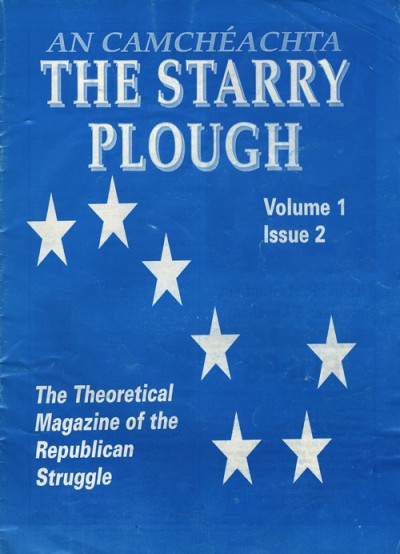
| Date: | 1991 |
|---|---|
| Organisation: | Sinn Féin |
| Publication: | The Starry Plough [SF] |
| Issue: | Volume 1, Number 2 |
Contributor:
Info | Mitchel McLaughlin |
| Type: | Publication Issue |
| View: | View Document |
| Discuss: | Comments on this document |
| Subjects: |
Please note: The Irish Left Archive is provided as a non-commercial historical resource, open to all, and has reproduced this document as an accessible digital reference. Copyright remains with its original authors. If used on other sites, we would appreciate a link back and reference to The Irish Left Archive, in addition to the original creators. For re-publication, commercial, or other uses, please contact the original owners. If documents provided to The Irish Left Archive have been created for or added to other online archives, please inform us so sources can be credited.
Commentary From The Cedar Lounge Revolution
11th February 2008
This weeks addition to the Archive is “An Camhéachta - The Starry Plough”, the Theoretical Magazine of the Republican Struggle issued by Sinn Féin in 1991. It’s an interesting read. This edition has the theme of Protestantism, Unionism & Loyalism. There is an article by Mitchel McLaughlin with that very title, a “Reaction to Sinn Féin Policies in the Protestant Community” by “A Derry Protestant”. Other pieces include a piece on “Partition - what it means for Irish Workers” and “Crisis in Women’s Funding - Lesson’s for the Women’s Movement”. Note the quotes from Alice Walker and others on the back cover.
There’s an interesting interview with Larry O’Toole who was regarded as having some chance in the 2007 Election in Dublin North East. I hadn’t realised he’d joined SF in 1984 - relatively recent. But perhaps his profile was typical of a shift in that party as the decade lengthened, having a background in community work and the unions. Certainly the language he uses in the interview speaks of a more clearly political direction.
The mention of Section 31 roots this in a different world.
The article on Partition is fascinating with a view of social reform and a fairly strong critique of the role of the Catholic Church that seems to be distinctly different to that seen in previous incarnations of Sinn Féin. Whether the idealistic view of a United Ireland propounded here is functionally realisable is almost admitted by the author when he states that ‘it is true a united Ireland would not necessarily do things differently but it is impossible to envisage any effective challenge to the present right-wing establishments, North and South, as long as partition persists and the working class remains divided’.
A “Derry Protestants” piece admits a slightly different truth. S/he notes that there ‘are severe limitations on Sinn Féin’s ability to influence the perception of their policies and strategies by Protestants’. Indeed. One might also point to the final sentence where s/he writes ‘What Protestants need is for their views to be taken seriously and incorporated in any solution. Is the Republican Movement willing to do this?’
It’s an interesting thought that the pieces seem to devolve Unionist identity to Protestantism (the terms are mentioned interchangeably in McLaughlins article) although they mention Loyalism and Unionism. It’s hard really to know what to make of that. Is it a reflection of a communalist reality or merely a pernicious a reductionism? That said McLaughlin is also highly critical of the anti-Protestant tradition within Republicanism but he goes on to make some fascinating statements. For example “The republican quarrel is with the British state in Ireland and the truth is that we cannot and should not ever try to coerce the Protestant people into a united Ireland”. Okay. That makes good sense. He continues, ‘We must convince them of the rightness of our cause and of the benefits accruing to them from advocacy of our cause’. That too makes good sense. It’s hard to read that and not feel that ground work was being laid for future events. Hey, hold on, why am I doing the reading for you all?
Overall? To my eyes it seems weak in terms of clear ideological underpinnings - indeed, and I know some won’t like this, perhaps the closest comparison might be the Democratic Left magazine Times Change. I mean that as no insult to either - or the (ex) members of either party - simply that the ‘socialism’ of this document is vague (much as DL seemed to cast around for a clear ideological position). But, it does at least appear to represent an effort to engage with some of the fundamental issues. How successfully I will leave to others to determine.
Please note file size is 9.3 mbs. If this is a significant problem for downloading just tell me and I’ll see what I can do…
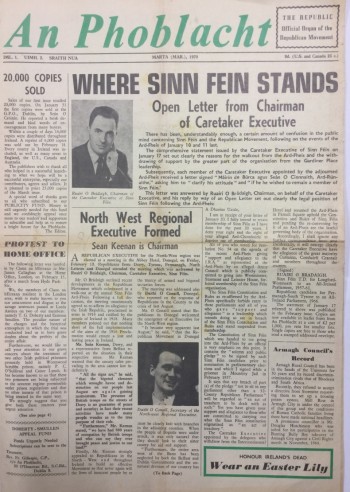
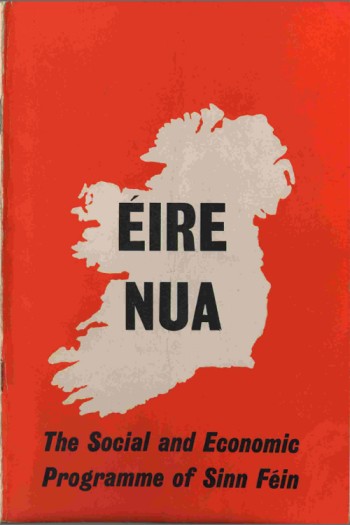
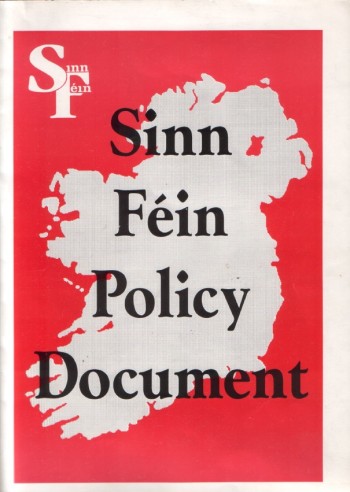
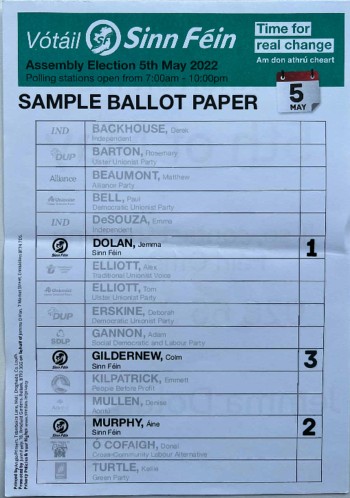
Comments
No Comments yet.
Add a Comment
Comments can be formatted in Markdown format . Use the toolbar to apply the correct syntax to your comment. The basic formats are:
**Bold text**
Bold text
_Italic text_
Italic text
[A link](http://www.example.com)
A link
You can join this discussion on The Cedar Lounge Revolution
By: Garibaldy Mon, 11 Feb 2008 21:53:46
Not unproblematic organisations, I agree. But then again they had trade unionists like Chris Hudson involved, while FAIT – for all its many faults – was providing a voice to working-class people who were being oppressed by paramilitaries. Some of the people who were targetted were nasty criminals, but their families often were not. And let’s not forget that even today the question of those exiled by paramilitaries is far from totally solved. This was and is (in so far as the dissident groups carry out the odd punishment attack) a question of democracy.
You don’t feel they added at all to a groundswell of opinion in the early 90s that made it clear that people were sick of the violence?
Reply on the CLR
By: WorldbyStorm Mon, 11 Feb 2008 22:13:30
No, not really. I think they were utterly peripheral. Worse again, many of the leading lights were clearly unable to deal with the cessations in any constructive fashion… and were all too eager to join the Cruise O’Brien/Harris etc choir which was not merely unhelpful but arguably destructive of the processes that brought around those cessations. As it happens I think that strain went much more with DL than with the WP.
Reply on the CLR
By: Garibaldy Mon, 11 Feb 2008 22:19:09
I think they were periperhal to changes in the Provos. What they did do possibly was to raise the consciousness of these issues in the south, and maybe among nationalists more generally in the north, and in that sense acclimatise people to protest against the violence, which contributed to bigger rallies after Warrington etc. But I’m more than willing to be convinced of the opposite. I’d also be likely to agree that most of the empty-headed trendy types went with the Dl 🙂
Reply on the CLR
By: WorldbyStorm Mon, 11 Feb 2008 22:24:13
😉 Truer than you might think…
Re the South… Again I’d remain unconvinced. There was little societal mobilisation for ‘peace’ in that sense. The RoI had subcontracted out all the messiness North of the Border and simply didn’t care that much one way or the other except on an almost rhetorical level. That’s not to say people supported violence, or wanted it prolonged, just that in the day to day run of things it wasn’t a hugely significant factor. After all, on a political level what evidence is there of any change? Fianna Fáil and Fine Gael moved serenely onwards. Labour which always half bought into that sort of discourse remained half-wedded to it. DL and WP didn’t alter… It might only be miles up the road but might as well be on the other side of the moon. And one might also note that from the time of the cessations onwards the SF vote began to rise, slowly, but surely… what exactly did that mean?
Reply on the CLR
By: Garibaldy Mon, 11 Feb 2008 22:40:05
Yeah I wasn’t suggesting that it changed the flow of southern society and politics. What I was thinking was that it made it more likely that crowds would turn out at the decisive moments. And IIRC there were many thousands who turned out.
The rise in the PSF vote is a complicated beast. I agree that the north didn’t damage them that much after the ceasefires, especially among younger voters. That vote is based on a reputation (deserved or not) for work on the ground, but also the awful state of the other parties, and the abandonment of on the ground work in working class areas by DL and Labour. The rise in the Green vote is to some extent similar, but much more to do with the general rise of eco-concerns.
Reply on the CLR
By: WorldbyStorm Mon, 11 Feb 2008 22:57:50
The Peace Train and associated groups were essentially manifestations of the middle class with some limited trade union attendance, members of WP/DL/Labour and so on. The middle classes already were antagonistic to the armed struggle. They were pretty much going to go out. And … more to the point I doubt those marches were contributing to the dynamic within SF. Hard to see the Army Council sitting around a table fretting that 20,000 marched or whatever. Sure they’d seen it all and a lot closer to home in the late 70s. Indeed I’d even think the proof of that, in a back handed way was the manner in which there was no residual fight to retain Articles 2 and 3 in their original form. People simply didn’t care enough about them.
Completely agree that the retreat of the left opened the way to SF… how far that worked is a moot point though their poll ratings remain pretty solid despite losing a seat.
Reply on the CLR
By: Garibaldy Mon, 11 Feb 2008 23:08:18
Something of a difference in that by around 1993 PSF were beginning to turn up at peace rallies. In that sense the reaction and pressure felt was very different to the 70s. Due to dynamics within PSF and the electoral concerns I agree.
I think PSF are close to their limits electorally. Plus or minus a seat, maybe two, but without a clear vision to become more distinctive, I can;t see them doing much. Although as someone here said previously I think, an economic crisis might change things.
Reply on the CLR
By: WorldbyStorm Tue, 12 Feb 2008 08:20:20
Those are interesting points. Looking at the doc above can’t help but feel that sort of appearance at peace rallies was long on the cards.
One thought… SF can still get votes in rural areas, indeed they’re now shifted towards the urban/rural rather than the purely urban as the WP was. Yet, if the FF vote softens I think they’re well positioned to claw back seats in cities… That does give them more comfort room if they can use it.
Reply on the CLR
By: Garibaldy Tue, 12 Feb 2008 11:18:22
Yeah I agree. As I’ve probably said before, I reckon they are taking FF votes more than the old hard left ones, which are probably going more to the Greens. Will be interesting to see how it shakes out.
Reply on the CLR
By: Joe Tue, 12 Feb 2008 15:54:42
I started to feel my hackles rise as I read your posts there WBS. I think it’s unfair to criticise the Peace Train people and other peace activists in this way. So a lot of them were middle class. Is it being suggested that middle class people getting involved in a campaign against sectarian terrrorism is somehow a bad thing? Sam McAughtry from the posh end of Tigers Bay for one might disagree.
You are indeed right that there was an apathy about the violence among most people in the South. They certainly didn’t actively support it but as long as it didn’t impinge on them in any real way, they got on with their lives. And wasn’t that what the peace train and similar people were, in some ways, trying to confront? They were saying straight out and clearly that the violence was wrong and should stop. I regret that I wasn’t as active as I should have been on such campaigns.
And all right, some people (including myself) took a while to get on board the Peace Process bandwagon. We didn’t trust the Provos or the other paramilitaries – with some reason surely.
Getting back to societal attitudes in the South. Most people didn’t want to know about the North but it was surprising (and to my mind, disgusting) how many people would suddenly reveal themselves as ambivalent about the Provo campaign when pressed. After the bomb that killed three people in London and ended the first ceasefire, I proposed a motion at my white collar union branch AGM calling on the Provos to stop the killing. It was passed at the Branch but at the National Conference it was referred back to the National Exec – apparently it was a one-sided motion.
So which were worse? Middle class people who joined campaigns against sectarian terror or middle class people who did nothing but equivocated when the issue was put up to them?
Reply on the CLR
By: ejh Tue, 12 Feb 2008 16:15:17
who did nothing but equivocated
Does this mean “who didn’t accept that the violence was all the fault of the Provos”?
Reply on the CLR
By: WorldbyStorm Tue, 12 Feb 2008 21:12:47
Joe, no disrespect to you or indeed to the many sincere people involved. The problem is that the peace activists didn’t come from positions that, with any serious will in the world, would be considered without baggage – which I think is the point ejh makes. I think that was the fatal flaw as regards their approach. Let me put it in more concrete terms. If Kevin Myers became prominent in such a grouping what – pragmatically – do you think the value or indeed the impact would be on the very people who one needed to bring over to a position, those who as you say might have a soft sympathy for the Provo’s? Furthermore because these were innately political organisations tied to other political organisations this rendered them as easily dismissed.
But, I think beyond that, there was one further problem with them. I have a heap of Times Change’s which I hope to post up in the Archive. As late as 1998 one sees the continuing residual inability to appreciate what was happening. I think that a dynamic of condemnation overtook any serious analysis of the actual events, that the Provo’s were moving first to cessations and then to withdrawal from violence. Simply put the analysis of the Peace Train was wrong because those involved not merely didn’t believe it themselves that the Provo’s could evolve, but once that evolution was well underway couldn’t bring themselves (in the main) to acknowledge it was happening.
As regards the middle class, my point is that to engage on this terrain the already converted (and as I’ve noted overly converted) weren’t sufficient. One needed to organise in the working class. There was precious little of that.
Reply on the CLR
By: Joe Mon, 18 Feb 2008 12:21:18
“who did nothing but equivocated”
Does this mean “who didn’t accept that the violence was all the fault of the Provos”?
Good question ejh. I dunno. I guess when for example the Provos put a bomb in a rubbish bin in Warrington and killed two children, I thought that that was all the fault of the Provos. I also reasoned that as a citizen of the Republic I had more of a duty (and more possibility of success) to call on the Provos to stop than to call on eg the UDA to stop. The reason being that the Provos were some of my neighbours, work colleagues, teammates, family.
When I proposed that motion at my union branch agm, in my head it made complete sense. The union “organised” white collar workers in the public sector in the Republic. It was an important part of civil society. The way I saw it, if it called on the Provos to stop, there was some possibility that this would have some influence on the Provos. More of a possibility than of it having any influence on the UDA for example. But there were always people there who would find some reason to sideline any action. I’m pretty sure that some of these people were supportive of the Provos and successfully stymied my valiant efforts with their nefarious manoeverings. Anyway that’s history now…not.
WBS, points well made on people not being willing to accept that the Provos were on the path to peace during the 90s. But to hell with you all, I’m still proud that the WP took the brave line that it did through the horror of the 70s, 80s and 90s. People had a duty to tell the Provos that they were wrong. They finally started to hear and do something about it in the 90s.
Reply on the CLR
By: WorldbyStorm Mon, 18 Feb 2008 18:19:23
I guess Joe I’d streamline my argument to as follows. I have no problem standing over what the parties (DL and WP) did and said (largely) up to the cessations – and would entirely support your stance. I have serious problems with how badly they received them (the cessations) and dealt with them. That I wouldn’t support and think was very bad faith considering the party had made a similar journey albeit earlier. I have an interesting doc for the Archive from the Republican Clubs which will help to contextualise some of this I hope…
Reply on the CLR
By: CL Mon, 18 Feb 2008 19:04:04
“so much sacrificed and so little gained… the futility of it all..”
-Brendan Hughes.
Reply on the CLR
By: chekov Mon, 18 Feb 2008 19:15:51
To my mind it’s pretty amazing that, knowing what we know today, people can still defend the Peace movements. We know that the horrible stuff was carried out just as much, if not more so, by the state as by the republican groups or by the loyalists. The peace movement essentially was defining peace as one side in a dirty war stopping fighting. They were, more or less, a pressure group in support of the British state’s policies on the north (i.e. the IRA should stop). The fact that the state that they were effectively supporting was involved in directing a whole host of sectarian murders sort of undermines their “peace” bona-fides.
Reply on the CLR
By: Starkadder Mon, 18 Feb 2008 20:08:08
I vaguely remember groups like the Peace Train Organisation
and the New Consensus group (which included Austen Morgan
& Harry Barnes, the Labour MP) being active in the early
1990s. They seemed fairly sincere in their desire to end
violence.
But as I recall, some people at the time echoed Chekov’s
claim that they were on the side of the British government
or a DL/WP anti-Shinner campaign.
Reply on the CLR
By: WorldbyStorm Mon, 18 Feb 2008 20:20:42
chekov, that too would be part of my critique… although I think the reality that the state itself was involved in collusion does not reflect in itself poorly on those who sought to look for peace. But again it does tend to speak of a certain lack of perspective on the nature of the problems they sought to solve.
Reply on the CLR
By: chekov Mon, 18 Feb 2008 20:36:51
I’m not questioning their sincerity at all – I recognise that the vast majority of those involved were genuine in their desire to see peace. However, they were politically naive to the point where they became part of the problem.
As a loose analogy, it would be like holding marches marches to ask the Iraqi insurgents to stop the bombings and thereby bring peace. To your average Iraqi, that would be simply demanding surrender to the invaders. If you want to persuade a group to do something, you at least have to try to look at the world from their point of view.
I also think that, in general, movements which purport to stand for abstractions such as peace and claim to have no political motivation are just deluding themselves and have a political position which is so deeply ingrained that they can’t even see it. Everybody is in favour of peace – they just have totally different ideas of how to get it, in the North these ranged from British withdrawal to provo surrender (which the peace movement and the Dublin government essentially echoed).
Marching in favour of ‘peace’ – you might as well march in favour of happiness.
Reply on the CLR
By: WorldbyStorm Mon, 18 Feb 2008 20:57:59
I entirely agree with the third sentence in your second paragraph.
Reply on the CLR